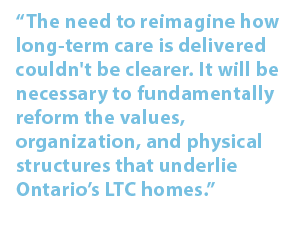A Place to Grow Old? Ontario’s Long-Term Care System Needs Transformational Change
The COVID-19 pandemic has been particularly devastating to Ontarians living in long-term care (LTC) homes where it has run rampant. It quickly unleashed a humanitarian crisis across our province that has unfortunately continued with the Omicron variant.
To date, over 37% of Ontario’s COVID-19 deaths have occurred in these homes that we had entrusted to care for our most vulnerable loved ones. Sadly, this tragedy has come as no surprise to the many experts who have been sounding the alarm for many years regarding inadequate funding, staffing, emergency preparedness, infection, prevention and control measures, limited accountability, transparency, and oversight, and enforceable standards of care. In fact, these are the very same challenges that were identified during the 2009 H1N1 flu pandemic and yet, over a decade later, continue to be faced today.
These past 22 months have demonstrated the consequences of government allowing neglect across our LTC system to continue. As outlined through the Canadian Armed Forces report, no Ontarian should be living in conditions that have mould or cockroaches and their causes of death should never be due to malnutrition or dehydration.
The current system isn't working. In fact, it’s broken.
The need to reimagine how long-term care is delivered couldn't be clearer. It will be necessary to fundamentally reform the values, organization, and physical structures that underlie Ontario’s LTC homes. It will take a commitment by our government to always put LTC residents and the staff who care for them before profits. It will take a necessary culture change.
A key component to implementing this culture change is to completely reform a LTC home's approach to care. Emotion-centred approaches have proven to benefit residents through reductions in unintended weight loss, falls, negative behavioural issues and the use of antipsychotics in those living with dementia, staff injuries, sick days and turnover. Indeed, this approach not only improves resident well-being, but also empowers staff and creates overall cost-savings for our broader healthcare system.
Following City Council's unanimous support for our initiative to implement an emotion-centred approach to care pilot in 2019, Toronto's Seniors Services and Long-Term Care division is now requesting City Council's support in the 2022 budget to expand its emotion-centred care initiative in one home, known as CareTO, across all 10 of its homes.
This new approach fundamentally increases the attention and support that its residents are given by ensuring the hours of care each resident receives daily, increases from 2.75 to 3.25 hours, has a renewed focus on training to ensure staff have the skills to provide culturally responsive emotion-centered care and creates more home-like environments.
Neighbouring cities and provinces should take note as Toronto moves forward to becoming a North American leader in LTC. Its commitment also fully aligns with the current new national standards for LTC that are also being developed by actively engaging residents, staff and loved ones to participate in this necessary work.
As we meaningfully focus on reforming LTC, we also mustn't forget to expand at-home supports and to continue to design our neighbourhoods to be more age-friendly and accessible to allow for more of us to age in the right place. In comparison to other OECD countries, Canada is ranked as having one of the lowest levels of spending on homecare. Innovative programs such as Canada's HomeShare program, initiated through Toronto's Seniors Strategy and the NORC Ambassador Program, spearheaded by UHN's OpenLab, have further demonstrated their ability to improve quality of life by reducing isolation and loneliness for community-dwelling older adults.
Ontarians are asking for transformational change in the way we best support our ageing population. Meaningful action must be taken to ensure that we can provide people the highest quality of care and standards of safety no matter way they wish to age.
Toronto is leading in this mission, and Ontario must follow. Those who we lost to COVID-19, and their families, deserve nothing less. Let this be their legacy.
Toronto City Councillor Josh Matlow and NIA Director of Health Policy Research Dr. Samir Sinha are Co-Chairs of the City of Toronto’s Seniors Strategy Accountability Table.

